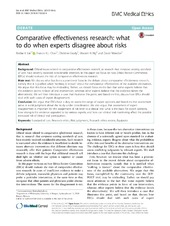| dc.contributor.author | Lie, Reidar K. | |
| dc.contributor.author | Chan, Francis KL | |
| dc.contributor.author | Grady, Christine | |
| dc.contributor.author | Ng, Vincent | |
| dc.contributor.author | Wendler, David | |
| dc.date.accessioned | 2017-08-11T09:23:16Z | |
| dc.date.available | 2017-08-11T09:23:16Z | |
| dc.date.issued | 2017-06-19 | |
| dc.Published | BMC Medical Ethics. 2017;18:42 | eng |
| dc.identifier.issn | 1472-6939 | |
| dc.identifier.uri | https://hdl.handle.net/1956/16269 | |
| dc.description.abstract | Background: Ethical issues related to comparative effectiveness research, or research that compares existing standards of care, have recently received considerable attention. In this paper we focus on how Ethics Review Committees (ERCs) should evaluate the risks of comparative effectiveness research. Main text: We discuss what has been a prominent focus in the debate about comparative effectiveness research, namely that it is justified when “nothing is known” about the comparative effectiveness of the available alternatives. We argue that this focus may be misleading. Rather, we should focus on the fact that some experts believe that the evidence points in favor of one intervention, whereas other experts believe that the evidence favors the alternative(s). We will then introduce a case that illustrates this point, and based on that, discuss how ERCs should deal with such cases of expert disagreement. Conclusion: We argue that ERCs have a duty to assess the range of expert opinions and based on that assessment arrive at a risk judgment about the study under consideration. We also argue that assessment of expert disagreement is important for the assignment of risk level to a clinical trial: what is the basis for expert opinions, how strong is the evidence appealed to by various experts, and how can clinical trial monitoring affect the possible increased risk of clinical trial participation. | en_US |
| dc.language.iso | eng | eng |
| dc.publisher | BioMed Central | eng |
| dc.rights | Attribution CC BY | eng |
| dc.rights.uri | http://creativecommons.org/licenses/by/4.0/ | eng |
| dc.subject | Standard of care | eng |
| dc.subject | Research ethics | eng |
| dc.subject | Risk judgments | eng |
| dc.subject | Research ethics review | eng |
| dc.subject | Equipoise | eng |
| dc.title | Comparative effectiveness research: what to do when experts disagree about risks | eng |
| dc.type | Peer reviewed | |
| dc.type | Journal article | |
| dc.date.updated | 2017-06-24T08:17:21Z | |
| dc.description.version | publishedVersion | |
| dc.rights.holder | Copyright the author(s) 2017 | eng |
| dc.identifier.doi | https://doi.org/10.1186/s12910-017-0202 | |
| dc.identifier.cristin | 1478627 | |
| dc.source.journal | BMC Medical Ethics | |

